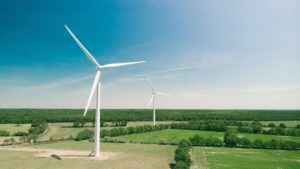
9th April 2021
I think we can all agree that cannibalism is a bad thing. Patrick Bateman? Bad. Hannibal Lecter? Definitely bad. Renewable energy infrastructure trusts? Bad.
Hang on – renewable energy trusts are bad? Surely they’re good?!
Well, yes and no. Renewable trusts – namely those investing in wind and solar assets (and some have also stretched into other areas like anaerobic digestion plants) have been great for investors over the past decade or so, delivering attractive dividends and some capital growth. Renewable energy generation as we all know is also good for the planet, as it reduces our reliance on fossil fuels, and it is good for consumers as it can lower their energy bills.
What’s not to like?
For consumers and the planet, maybe a bit of noise pollution or an eyesore. But for investors in the long run, there might be a much bigger problem. Wind and solar assets generate returns for investors by selling the energy they generate to the national grid, or direct to businesses/consumers. Many projects have received government subsidies, and operate on long term contracts guaranteeing a certain level of income over a defined period. However, once that contract is up, the revenues are tied to wholesale energy prices – and this is where the cannibals come in.
The more renewable energy generation, the greater the downward pressure on wholesale power prices. The marginal cost of generating energy from a solar panel or a wind turbine is very low, especially when compared to the cost of digging up coal or drilling for oil. This pushes down energy prices. Lower energy prices mean lower revenues, meaning lower returns for investors.
This week, Bloomberg New Energy Finance released their latest energy price forecast report. They anticipate a whopping 36% decline in real power prices by 2030. If that occurs, it will result in very large asset value declines for the renewable energy trusts (whose asset values price in much higher long term energy prices), and it would put significant downward pressure on their ability to pay current dividend levels long into the future.
Now, the report is very pessimistic, and has been for a couple of years. It should be taken with a good handful of salt. However, the cannibalisation effect it alludes to over the long term is very real, and is one of the primary reasons why we don’t currently own renewable energy generating assets in our Funds.
We do, however, own battery storage assets, which are vital parts of the renewable energy infrastructure. These make their revenue from the volatility of power prices, as opposed to the absolute level. The greater the proportion of the energy mix that is generated from renewables, the greater the volatility we see in power prices, and the more money batteries can make. This is because renewable energy is very intermittent – you need the wind to blow and the sun to shine. Batteries store up the energy when it is generated and prices are low, and then sell it back to the grid when prices are higher (i.e. in the middle of the working day when demand is high). Batteries also provide a service to the National Grid by being able to react to fluctuations in energy frequency across the network (National Grid needs to keep the energy frequency stable to prevent your toaster bursting into flames) and effectively pays to rent battery capacity to ensure they can deliver a consistent frequency across the grid at all times.
So, we will continue to avoid cannibals in our Funds, and hope you avoid any in real life too!
Dan Cartridge – Assistant Fund Manager

This financial promotion is issued by Hawksmoor Fund Managers which is a trading name of Hawksmoor Investment Management (“Hawksmoor”). Hawksmoor is authorised and regulated by the Financial Conduct Authority. Hawksmoor’s registered office is 2nd Floor Stratus House, Emperor Way, Exeter Business Park, Exeter, Devon EX1 3QS. Company Number: 6307442. This document does not constitute an offer or invitation to any person, nor should its content be interpreted as investment or tax advice for which you should consult your financial adviser and/or accountant. The information and opinions it contains have been compiled or arrived at from sources believed to be reliable at the time and are given in good faith, but no representation is made as to their accuracy, completeness or correctness. Any opinion expressed in this document, whether in general or both on the performance of individual securities and in a wider economic context, represents the views of Hawksmoor at the time of preparation and may be subject to change. Past performance is not a guide to future performance. The value of an investment and any income from it can fall as well as rise as a result of market and currency fluctuations. You may not get back the amount you originally invested. HA4352.
